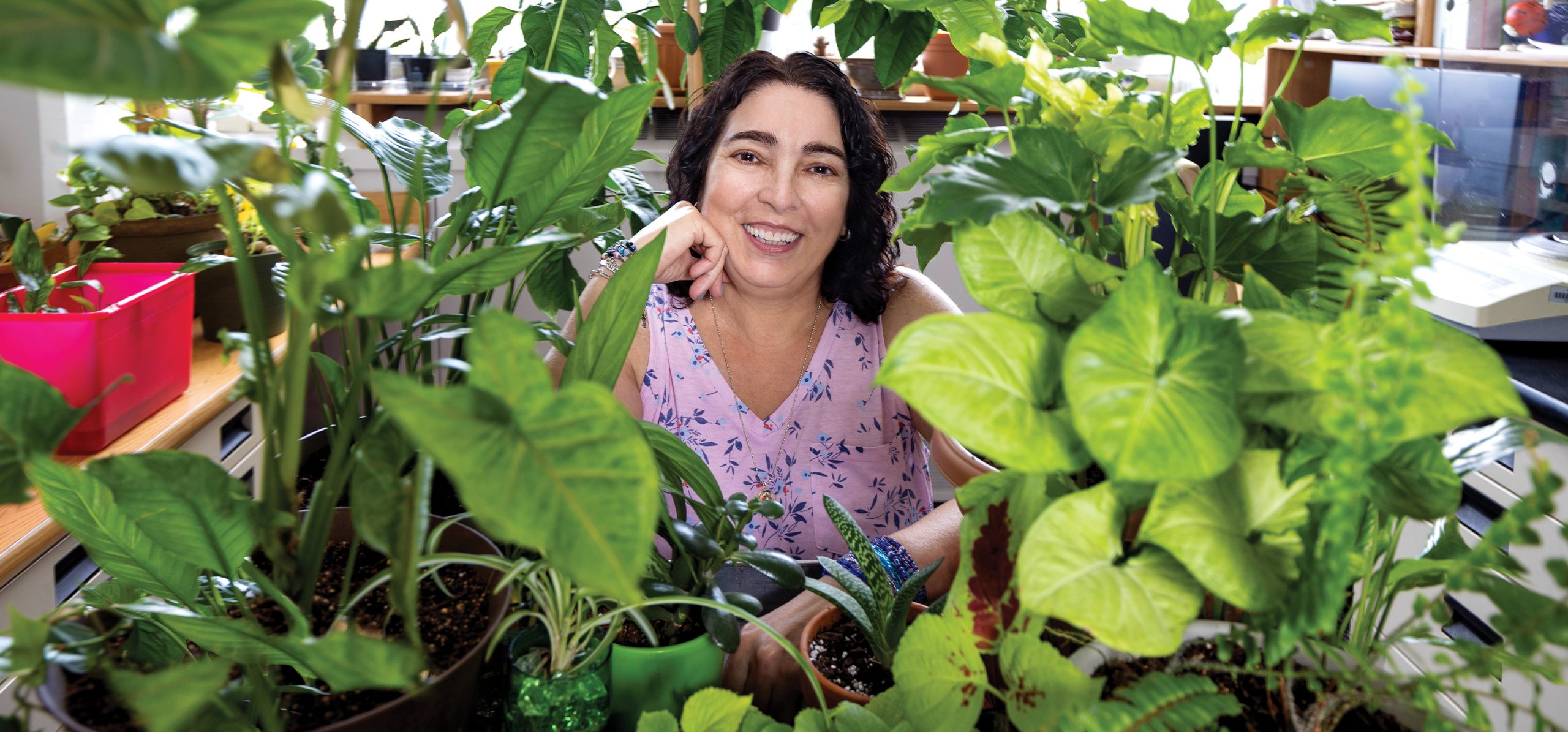
Lisa Buonocore’s room on the fifth floor of the Forchheimer Building may remind you of the nearby New York Botanical Garden. More than 40 plants thrive in her small, rectangular space, where this lab assistant has cleaned and sterilized glassware at Einstein for the past 32 years.
On two sides of her room, the shelves, the supply cabinet, and even the top level of a supply cart are lined with colorful pots. Arrowhead vines, avocados, angel wing and star leaf begonias, Boston ferns, peperomias, purple shamrocks, spider plants, and succulents, including small cactuses and striped zebra haworthias, all coexist happily. A shelf across the room is stacked with boxes and supplies for the nearby labs and fronted by leaf cuttings taking root in glasses of water.
What’s remarkable about this collection of thriving plants is the absence of windows in the room. The steam from an autoclave provides moisture, and two nearby ovens for drying keep things toasty. The ceiling’s fluorescent bulbs—the sole source of light—are clearly sufficient for photosynthesis.
Ms. Buonocore is in her office Monday through Friday from early morning to midafternoon, but the lights typically stay on much longer as people come in and out to collect glassware, including on weekends. The closer the plants are to the fluorescent fixtures, the greater the amount of light they absorb to help make the sugars they need to thrive. If a plant on a lower shelf starts to look a bit faded, Ms. Buonocore knows to rotate it to a higher shelf.
Ms. Buonocore’s plant education began when she was young and she helped her grandfather in his backyard garden. “He grew tomatoes and zucchini, plus he had some peach trees,” she says. “I also helped him trim the hedges.”
She lives now in the house her grandfather lived in, eight blocks from Einstein—close enough for her to walk to and from work every day, often carrying plants that need repotting, bags of soil, or fertilizer. Nearly all the plants in her office have sprouted from leaf cuttings or from seeds.
Over the years, Ms. Buonocore has augmented her grandfather’s tomato and zucchini patch with other vegetables, including carrots, celery, lettuce, peppers, green beans, and an assortment of herbs.
While many plants in offices withered during the COVID-19 lockdown, hers flourished and even multiplied. “The education buildings were closed, but I knew the doctors were in the labs doing experiments they had to come in to complete,” she says. So as soon as she was told she could return, she did.
“Lisa’s work, including coming in during the COVID-19 pandemic, was absolutely essential for my lab and for the other labs on the floor,” says Rajat Singh, M.D., M.B.B.S., professor of medicine and of developmental and molecular biology at Einstein, who has worked with Ms. Buonocore for 12 years. “She is an amazing worker, but she is also one of the nicest people on this planet.”
When some labs were short on staff, Ms. Buonocore pitched in at a nearby office. “It felt so bare because there were no plants in there,” she says. So she brought some in, including a tiny lemon tree she’d recently started from a seed. “Having plants in an office just makes you feel better,” she notes.
As Ms. Buonocore’s plant collection has grown, so has the number of friends and colleagues who stop by to admire it. Some trade plants with her or give her flowerpots. She has also given some plants, especially varieties that do well near large windows, as gifts to colleagues who work in nearby labs. And she has become the go-to source for people with failing plants in need of emergency care.
“A student gave me a money tree [a tropical houseplant] when he left the department, and I left it in my office,” says Rachel Hazan, Ph.D., professor of pathology, who has worked with Ms. Buonocore for 20 years. “Soon it looked completely dead. I asked Lisa, ‘Should I throw it out?’ She said, ‘No, no, no,’ and she took it, and now it looks beautiful.” It sits near a lab window close to Ms. Buonocore’s lemon tree, which is now seven feet tall. “I tell Lisa she runs Einstein’s plant hospital,” adds Dr. Singh with a smile.